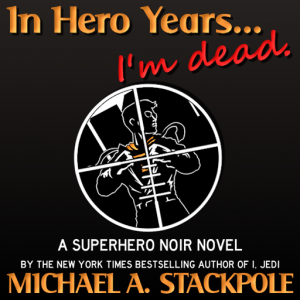Ask Dr. Sinisterion: Can one dupe a genius?
(Because of rebuilding the webstore, I’m a bit behind in my blogging. Luckily, there’s a brilliant and infinitely talented guest blogger (whose denials of being a consultant for Wikileaks ring hollow) who has once again come to the rescue. Here is his latest dose of insights about the world from a decidedly and distinctly unique point of view. Please join me in welcoming Doctor Sinisterion.—Mike Stackpole)
Doctor Sinisterion (D. D.), is the author of the recent book If I Was A Supervillain. Having retired after a long career as a spiritual consultant and entrepreneur, he took time to study many of the great criminal enterprises of our time, and offers his critique of them in his book. Critics have suggested the book is merely an exercise in revisionist history. He scoffs at his critics and looks forward to their delight when those “secret” and “private” pictures they have of themselves—yes, the ones in the encrypted file reading “Xmas Wish List”—earn them their own reality television show. He has recently undertaken a new line of work: he is now a life coach for those in the costumed trade.
Dear Doctor Sinisterion,
Not being a mastermind nor a genius. Is it possible to dupe geniuses to do your mental heavy lifting?
John
Dear John,
You ask a very important question, within which are hidden the seeds of why many a genius—armored in his arrogance—suffers a downfall and meets an untimely fate. Your very question suggests that it is difficult to dupe a genius. Indeed, it is—but only in the mind of said genius.
I have elucidated a theory in my book which I refer to as The Smart Man Fallacy. A man who believes himself intelligent, going into a situation where he suspects he will be duped—say visiting a psychic—will tell himself, “I am a smart man. If he is playing a trick, I will spot it.” Subsequently, when the psychic reveals a great deal about the man, he is faced with a problem: He can either believe he is not so smart or that the psychic truly has miraculous powers.
Which choice do you think he will make?
Mind you, were the same genius to attend a performance by a magician and fail to see the tricks, he’d not assume the magician had miraculous powers. He’d assume the magician had practiced a great deal, and would admire his skills. The idea that a psychic might, similarly, have a bag of tricks with which to fool the experientially-disadvantaged just never occurs to him.
Victor “The Count” Lustig was a grifter working the United States in the 1920s. At one point he asked Al Capone for a loan of $50,000; telling the gangster he could double it in sixty-days with a con. Lustig took the murderer’s money and vanished for two months. As far as Capone was concerned, the man had fallen off the edge of the Earth.
Two months later Lustig returned to Chicago to report on his venture. He very politely informed Capone that his scheme had failed. He’d not doubled Capone’s money.
Needless to say, this did not please Capone. Given Capone’s anger management issues and robust failure-elimination program, making this report could have been considered an act of suicide. Before Capone could react, however, Lustig reached into his pocket and produced $50,000, placing it neatly on Capone’s desk. Rather shamefacedly he again apologized for his failure to make the plan work.
He rose to leave, but an astonished Capone stopped him. The gangster had expected $100,000 or nothing—in which case Lustig’s life would have been worth less that a blown secret identity. To be given back his investment completely surprised Capone. “My God, you’re honest!” he’s reported to have exclaimed. He counted out $5000.00 and handed it to Lustig for his honesty. The grifter, surprised, thanked him and departed.
And this, you see—according to Jay Robert Nash, in his book Hustlers and Conmen—was Lustig’s aim all along. When he got Capone’s money, he placed it in a safe deposit box for two months. He counted on Capone rewarding him for his honesty. It was a very gutsy play, but worked precisely because Capone was confident that no one would be so foolish as to try to swindle him. That arrogance, just like being sure of one’s own genius, made him vulnerable.
So, yes, John (if that is your real name), it’s simple to dupe a genius into doing your mental heavy lifting. Do recall, genius does have its limitations, however. I’d rather have a thousand drooling morons in a mob doing my bidding, than a single genius tasked to attain my ends. Heavy lifting, after all, is seldom ever mental.
In Hero Years… I’m Dead is also now available for your Kindle. Click this link for the basic edition and this link for the Deluxe Edition



 21. Jan, 2011
21. Jan, 2011 








2 Responses to “Ask Dr. Sinisterion: Can one dupe a genius?”